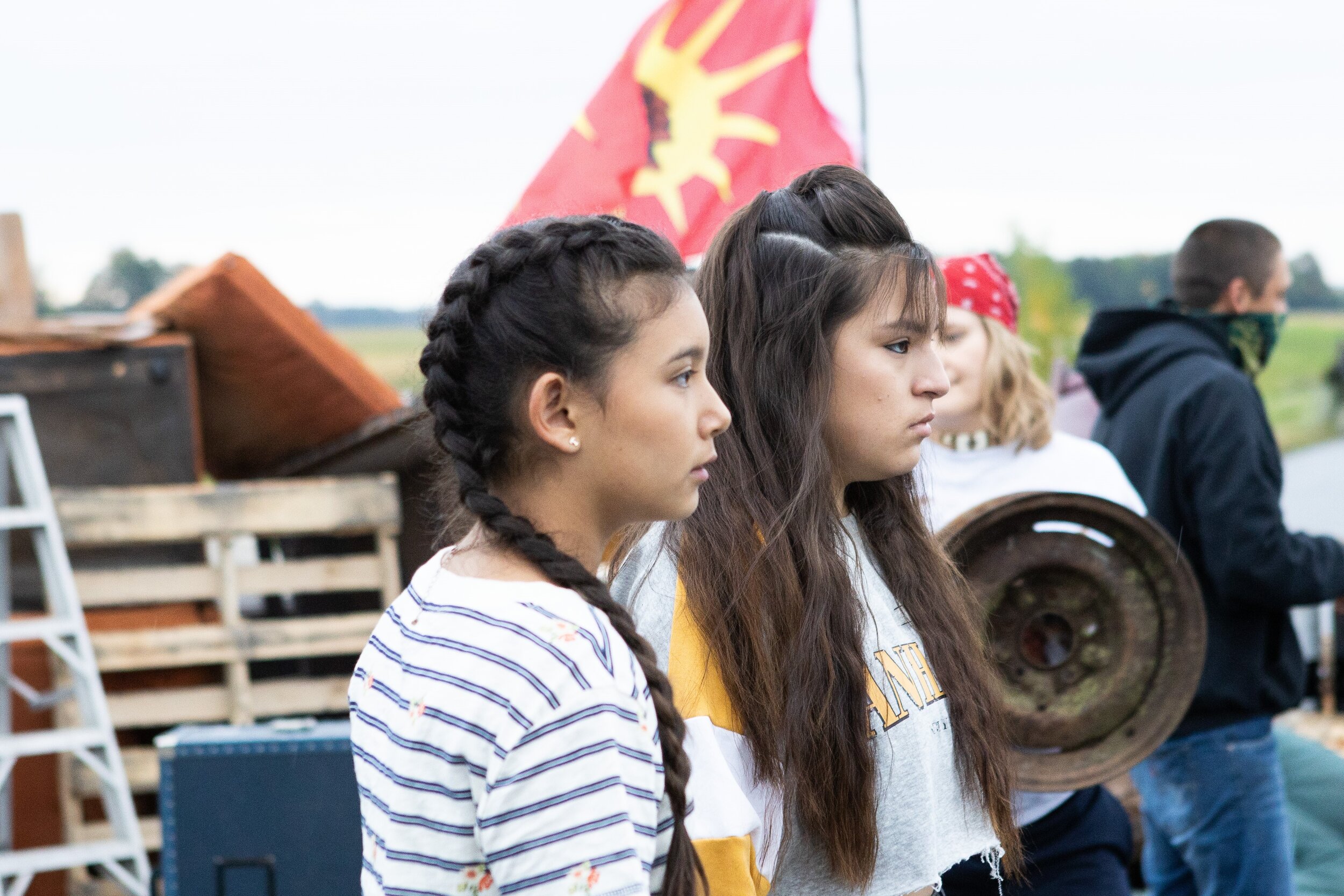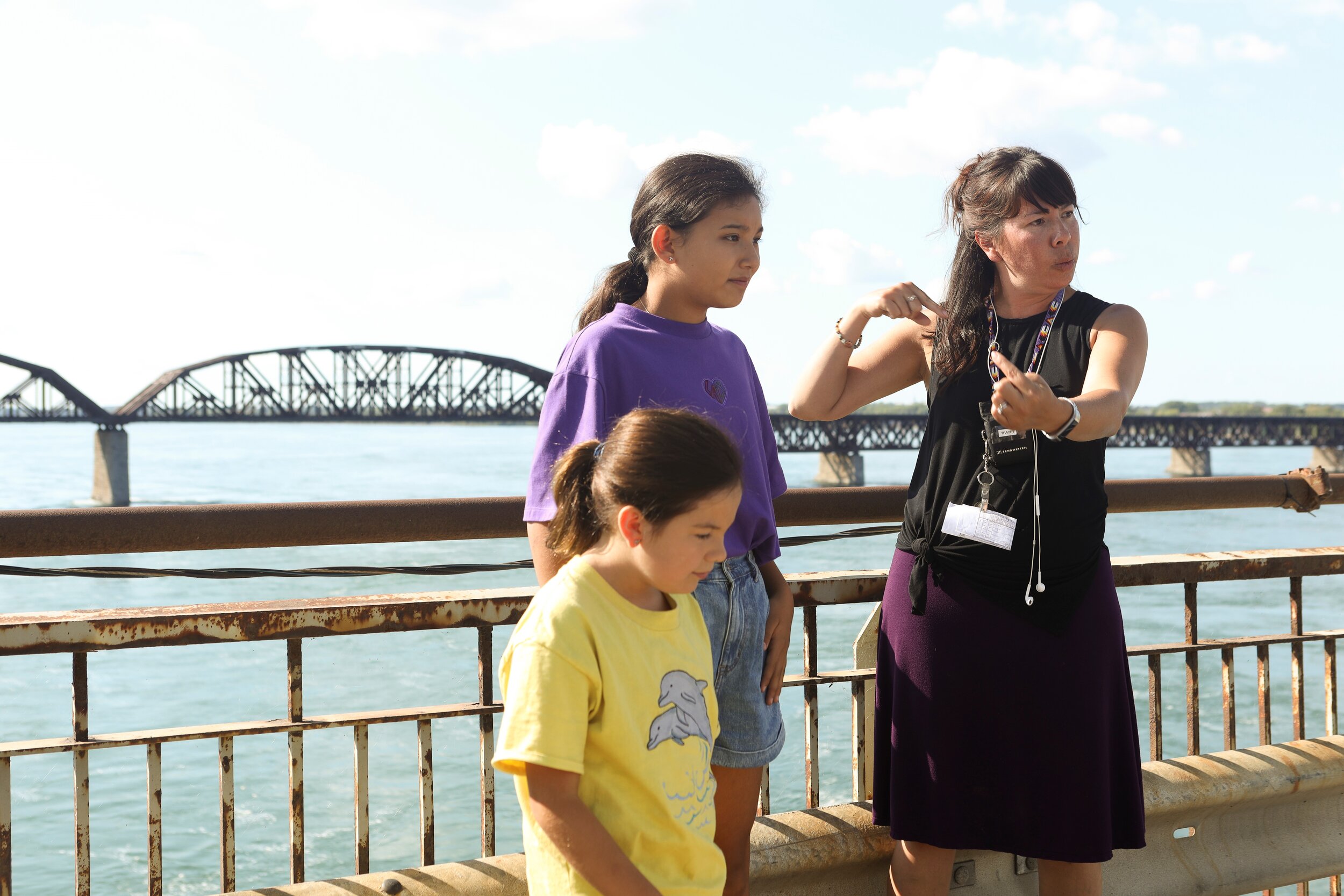Original-Cin Q&A: Beans director Tracey Deer and young star talk about their teen's eye view of the Oka crisis
Better late than never for Beans, the extraordinary film that debuted at the Toronto International Film Festival and deservedly won Best Picture at the Canadian Screen Awards. It opens in theatres in major Canadian markets on Friday, July 23.
Beans is the true story of filmmaker Tracey Deer's experiences as a child witnessing the Oka crisis. She's portrayed by the wonderfully talented young actor Kiawentiio, who’d had almost no professional experience before taking on the role.
Our Bonnie Laufer spoke with Tracey Deer and Kiawentiio about working on the film. (And be sure to read our review of Beans).
Facing the fight: Kiawentiio as Beans and Paulina Alexis as April. Photo by Sebastien Raymond.
ORIGINAL-CIN: Tracey, I have to start by congratulating you on all of the accolades for Beans. You must still be living the dream of winning Best Picture at the Canadian Screen Awards.
TRACEY DEER: Thank you so much. I am still processing, honestly. It’s all so surreal. It's been an incredible six months and to get Best Picture of the year in Canada. It's more than I ever hoped for.
O-C: When this movie was presented for the first time last year at The Toronto International Film Festival, it absolutely blew me away. Kiawentiio, your performance in this movie is extraordinary, I truly believed you must have started acting from the womb. When you landed the role, what kind of challenge was it for you, and were you nervous about not only telling Tracey’s story but carrying the film?
KIAWENTIIO: I think I was very nervous. But I tried to get over that really fast. I didn't really have a lot of experience before this, only a small part on Anne With an E. So this was a huge deal for me.
It was a little nerve-wracking because we knew going in that this is a huge part and I would be working in almost every scene. But Tracey just made me feel so comfortable, and immediately took away any scary feelings that I had.
PROUDLY SUPPORTS ORIGINAL-CIN
O-C: Tracey, this is a very personal story. I’m sure it had to have been a cathartic experience even just writing it. What did you see in Kiawentiio that made you cast her, because after all she is representing you at a young age.
DEER: I originally met Kiawentiio on Anne With An E, because I was on that third season. And so, during that casting process, she was on a shortlist for the show and she was there as a part of this workshop that they were having.
Even then, I had my own film that I was prepping and thinking about who I was going to cast as Beans. As soon as I saw KIawentiio I thought, “I've met her!”
O-C: It was like a gift being presented to you at the right place at the right time!
DEER: That's for sure. In terms of the character, it's really great when a person can bring a lot of who they actually are to the role. And Kaiwentiio is an artist through and through. I think that has been apparent straight from the womb. Everything about her is artistic and open and the sensitivity is there. The bravery is there and all of these things are necessary to take on a role like this, and all of these were key elements to the character as well.
Tracey Deer (right) directing Kiawentiio (middle) and Violah Beavais (left). Photo by Sebastien Raymond.
When you're casting, it's often a feeling that you're looking for, and I had the feeling every single time I saw her audition or perform. So I'm so thrilled that she and her family were willing to take on this specific project.
O-C: Kiawentiio, you're not only playing a young girl in a coming-of-age story, but you're dealing with this crisis that is happening to your family and your community. Tell me a little bit about how you prepared yourself for the role. Aside from having Tracey’s script and having Tracy there all the time. Did you do any research about the Oka crisis?
KIAWENTIIO: I think we did watch a few documentaries, and I got an overview. I know it's very different from my parents' view, because we live about an hour away from where it all took place. I got kind of more my parents' view on it. But you know, they went through things too.
My dad wanted to go and help, but being a 15-year-old at the time. His mom didn't want him anywhere near there. So I mainly relied on Tracey if I had any questions or needed context.
O-C: You mentioned your parents. How helpful were they to you during this whole process?
KIAWENTIIO: My parents have always been so supportive, and it's crazy when I think about it because they're just always there for me. After a long day or a really hard shoot day, they just understood that all I wanted to do was sleep.
I was literally falling asleep in the car on the way home. (Laughs) I remember after a long day of working, I would be like a zombie.
O-C: There are so many powerful and memorable moments in this movie. Tracey, tell me a little bit about what it was like for you to go back and relive this time in your life.
DEER: It was really, really hard. It was hard to write it, but then having to recreate it was an entirely new level of hard.
Not only was it going back into the most traumatic memories, but I needed to put that aside in the moment and put on my director's hat. I did everything I could to make the day go as smoothly as possible and ensure everyone's safety. Kiawentiio can speak to this herself but I did try very hard for every day to be fun and keep it as light as possible on set, especially in between takes.
These are children. Children shouldn't actually be working. So, it's only okay with me if they are having fun, while doing something like this.
So, that's what got me through those days, having on my director's hat, and knowing I was responsible for the crew and the cast. I was just being very strategic as to how we shot this in such a way as to limit traumatizing anyone or re-traumatizing anyone. That was very important to me and the production. So that's what got me through.
O-C; I honestly do not know how you personally got through shooting some of the scenes.
DEER: At the end of every day, I’m not saying it was easy because it wasn’t. I did come back to that little girl and I would sob. I would bawl my eyes out in the car and I would cry on the way to set often.
But, as you said, cathartic is really the word to put this whole experience into perspective. It was super hard to do this. But having it out in the world, having people bear witness to what I went through - what we went through - and knowing now that the story is out there. These moments will not be forgotten and hopefully it will create some awareness and a movement towards change. That hope made every minute of making this film worthwhile.
O-C: One of the major themes of Beans is strength, especially strength in women and young girls. Now, especially after working on the film, what advice do you want to give to young girls?
KIAWENTIIO: A lot of people ask me for advice but sometimes I don't really know what to say. I'm only 15, I haven't lived a lot of life yet. But I think just be truly yourself no matter who tries to take that from you, and just try your best to pull yourself through.




